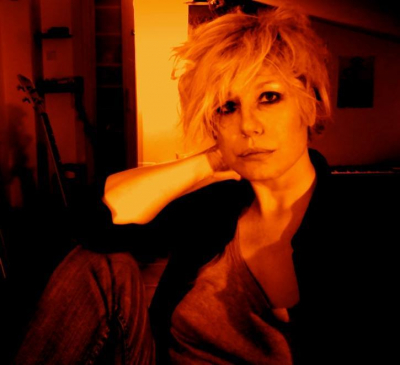Corso Italia 7
Rivista internazionale di Letteratura – International Journal of LiteratureDiretta da Daniela Marcheschi

For David
And then there’s this woman.
The first time she comes she’s still a girl, blonde regrowth betraying her reddish brown hair, a green cotton dress dotted with tiny flowers, a black shirt tied at the waist (with sleeves rolled up past her elbows), and a dark blue bone necklace. She’s just over 20 and in love. Her firm, tanned legs protrude from the unbuttoned slit of her dress with all the innocent pride of beauty, youth and health, blinded like every 20-year-old by her own adolescent sun, by the glare of her own light. She is about to write things like the creature of your dreams was uncontaminated, not violated by limitations and ugliness, living in the light of perfect desire; the real person had a past, immersed in the darkness of worldly things. This is where the heightening of your desire for isolation comes from: you wanted to emulate the perfection of the dream to a boy who is soon to call her “my minor chord,” but in the meantime she comes to the intersection between Avenue de la Chapelle and the Avenue Latérale du Sud (the Carrefour du Grand Rond lying down beyond, ahead of her), she turns right and then takes the first left onto Chemin Denon, here where we are, in the Eleventh Section.
Me and Claire, my bride, my bird-woman from the ultraworld, watch her come closer and smile once more at these young things, tender morsels of solemnity: the gaze that leaves the paper map and, having identified the target with certainty, dons its most exquisite pathos as the step slows to a linger. Yes. Europe will surely perish, wiped out by the Eurococcus, but these romantic girls with their flighty legs and two-tone tresses will never stop writing confessions and poems for their complicated musical beloveds, nor will they stop walking through the shadows of these pathways.
She does not know that we, Claire and I, also had our own precious portrait as a couple: it was painted for us by the blue painter, the painter of flying lovers, those dwelling on roofs and treetops, those lovers who chart the skies; the painter of gentle smiling beasts beneath the full moon, of weightless brides on strings like so many balloons. We are portrayed together, Claire and I, looking in the same direction, like two busts side by side on a coin.
But she doesn’t know that. There is only one portrait in her eyes: Frédéric at the pianoforte, Amantine sitting at his side, sewing: an unfinished canvas, severed in two, a famous couple divided just as much in their pictorial portrayal as in life itself. Pure romantic spirit. Claire and I, on the other hand, have never been subjected to separation, not even here where we are now. Fragile Hermaphroditewho breaks every lawDoes he even know whether he is double or if he is half? This is what I was and am with Claire; a story of love and art, our own story, which the girl (along with her diaries and poems) would really appreciate if only she would look over to us. But Claire and I know full well that this is not possible, that she cannot let her curiosity get the better of her, she cannot peer our way, not with HIM here, not with all those flowers piled up and the petrified pain of the Muse, not with all those handwritten notes and scraps of musical score, not with her 20 years of age, the age of intoxication with the absolute, the age of dazzled vision. And so Claire and I feel no affliction nor envy nor annoyance, just as we remain unbothered by all those feet that endlessly shuffle over our names only so as to draw a little closer to the pained Muse, to see that little better (to see what? Some miracle that makes the sculpted stone weep real or musical tears?). And HIM, the Pole, what does he have to say for himself? He says nothing – he can’t, for his heart is elsewhere; it’s in Warsaw in a church, and so he can’t do anything but remain silent, nothing but a corpse full of night, and so all this coming and going of people is tragicomic – this speaking and whispering and praying while looking at the stony Muse, this clambering over the other tombs to reach up to it, all this leaving notes and scores – when HE cannot hear. Claire and I, on the other hand, can see and hear, laid out as we are below ground, our hearts laid bare to the elements, so close to the mystery.
When the girl comes back, many years have passed and she is a woman. This time there are a man and a young girl with her, and she is in love with both of them. They have just stopped off for a snack on a bench along Avenue Saint Morys, after the woman showed the child the grave of Gustave, who drew the frowning devil tattooed on her breast. When they get to us, the woman is holding the child by the hand, telling her that at home she will definitely play her Sonata No. 2 and that Nocturne that was on the carillon that she had given so long ago to her old musician boyfriend. The child gazes at her like one gazes from a ship at a lighthouse in the night, and the woman has never felt more necessary and complete as ever since she has had her daughter with her, who is now looking at Frédéric’s Muse and wants her father to lift her to let her see it close up, while the woman – whose light now, no longer that of high noon but rather dusky, knows how to let her sight settle on the shadows and the things that rest beneath them – turns towards us, towards our stone, and reads the French below our names:
I may have lasted no longer than the foam on the lip of the wave upon the sand
Born beneath no star on a moonless night
My name was nothing but a fleeting sigh
Here lies Landless John
and she wonders just who Yvan and Claire Goll were, before they became Chopin’s neighbours at the Paris cemetery of Père Lachaise, which immediately leads her to fantasise about those posthumous silhouettes that Claire and I have become and what our non-life might be like, among the shadows, our identity overstepped by every passerby, every visitor overwhelmed by our renowned neighbour, and which, along with a number of (rather dull) mental considerations of a philosophical kind, gives her the idea of trying to tell all this in writing, and so, on returning home and having looked us up and discovered who Claire and I were when alive, she ends up reading my poem on that weary hero and pilgrim who travelled around the earth seven times, and nonchalantly slipping a few lines of it into the short story which starts off, And then there’s this woman.
Translation of Bennet Bezalgette-Staples
Per commentare gli articoli è necessario essere registrati
Se sei un utente registrato puoi accedere al tuo account cliccando qui
oppure puoi creare un nuovo account cliccando qui


Commenta la notizia
Devi essere connesso per inviare un commento.